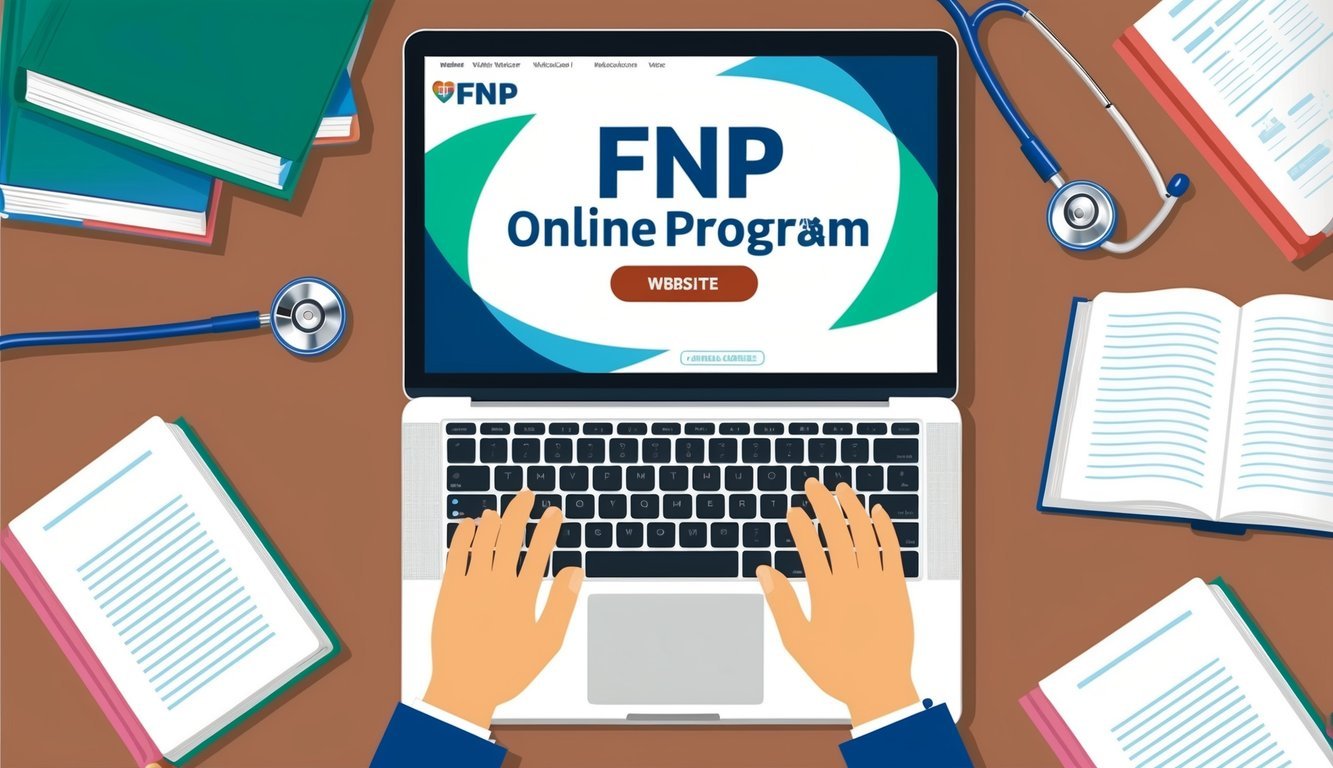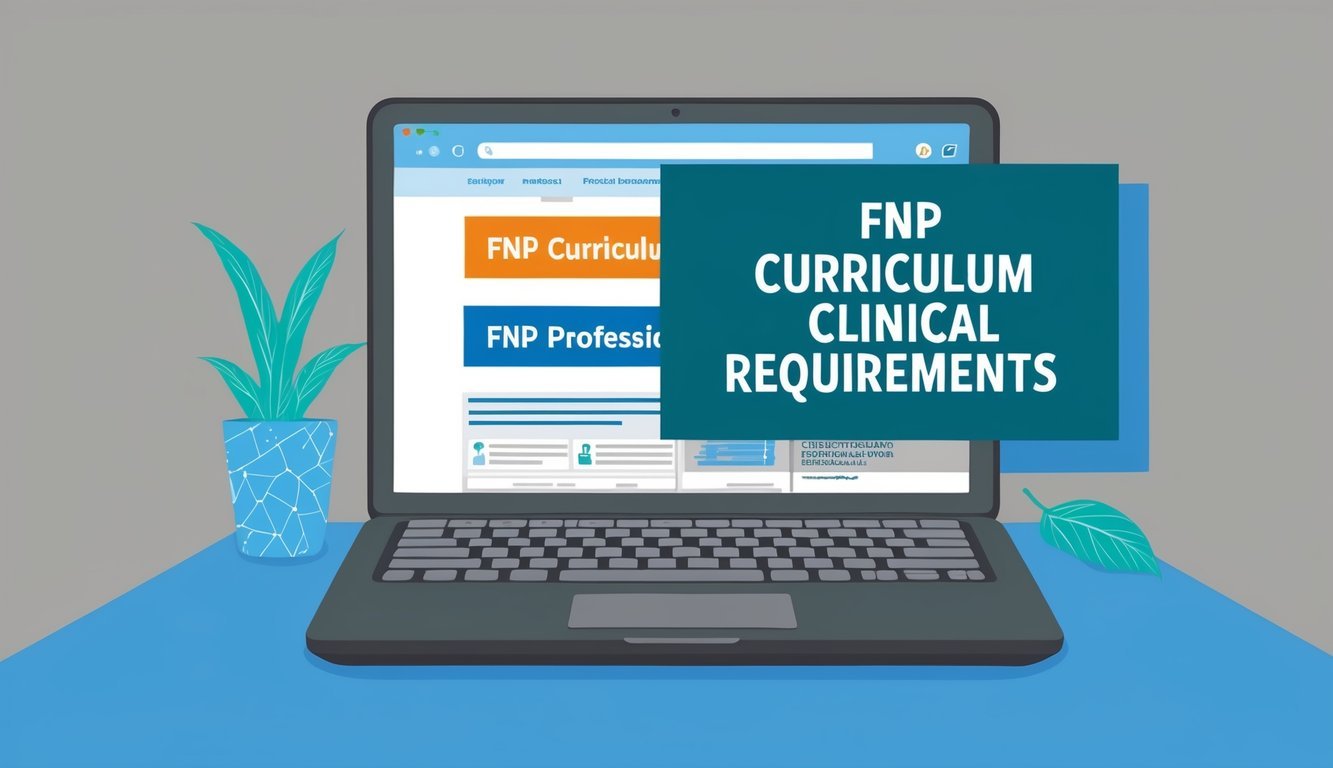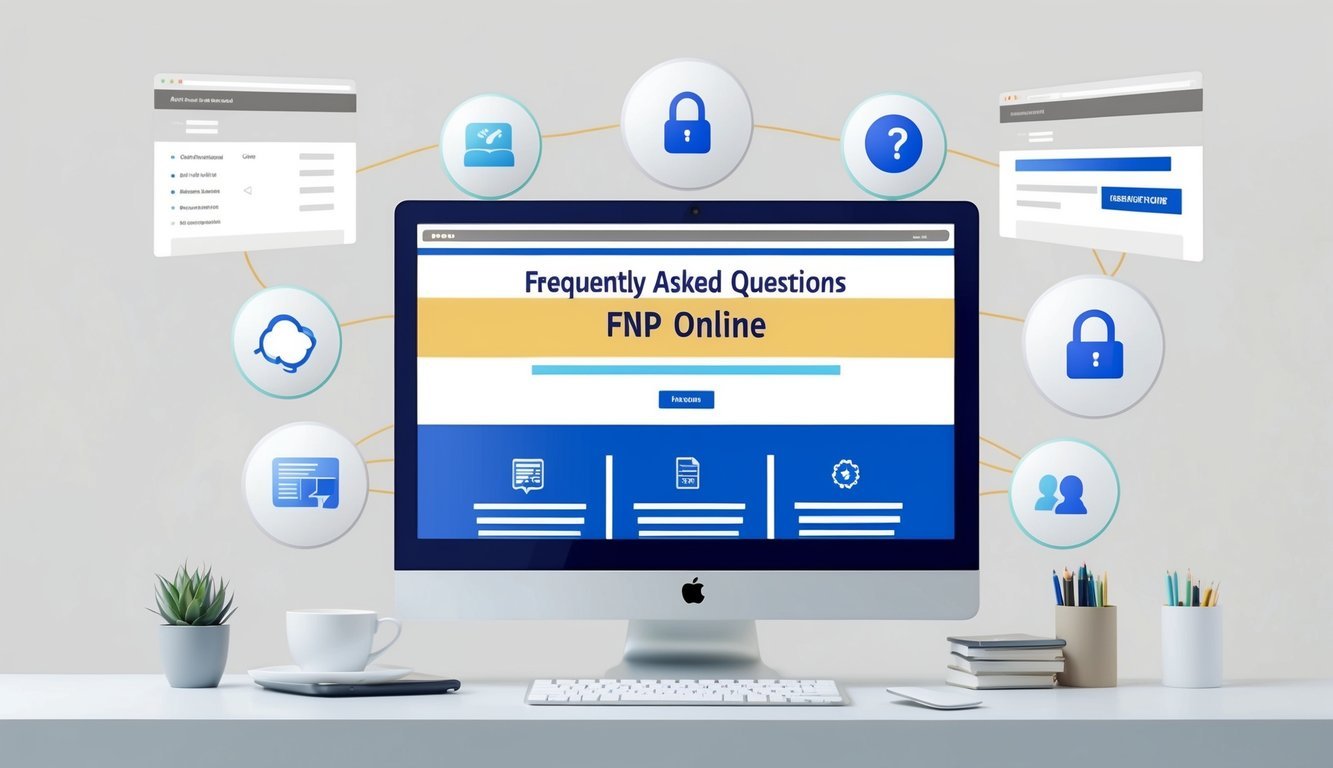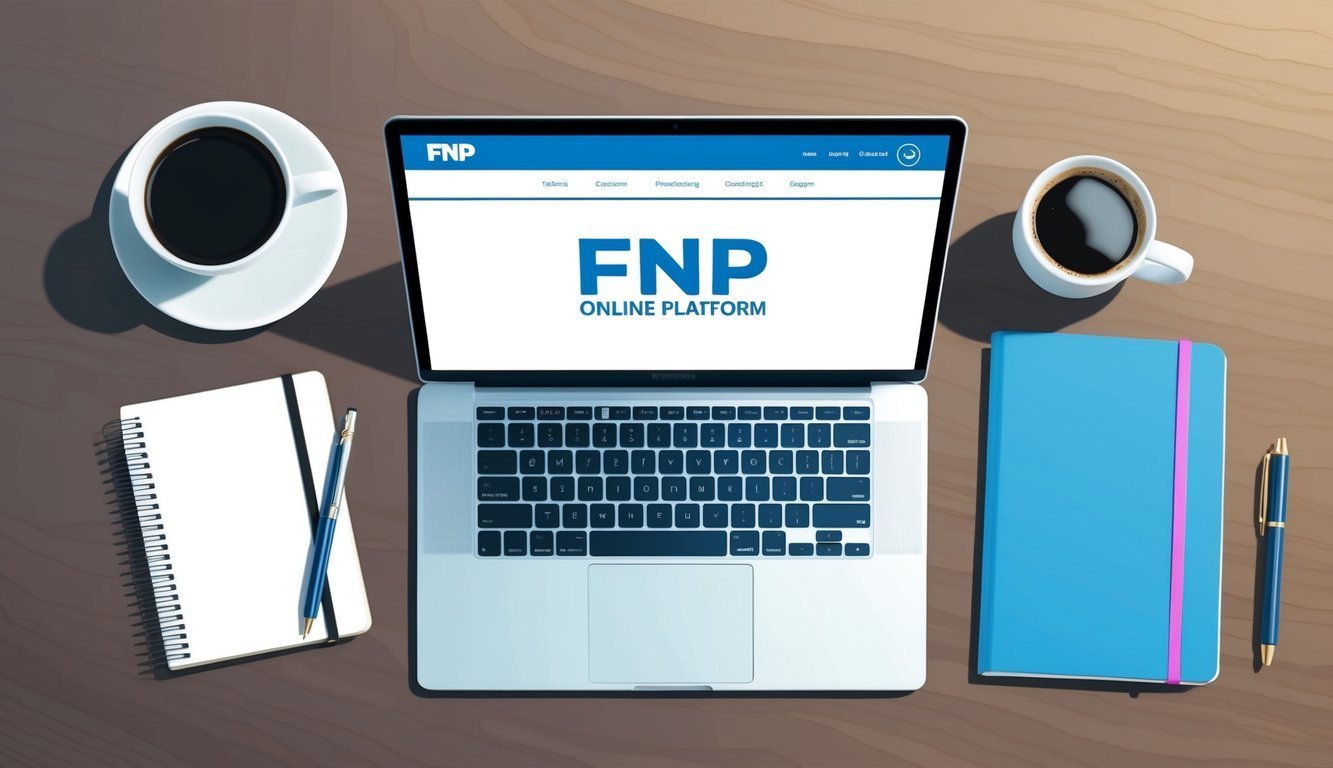Becoming a Family Nurse Practitioner (FNP) offers a rewarding path for those looking to advance their nursing careers. Pursuing an FNP online allows you to balance professional responsibilities while gaining the education needed to provide high-quality patient care.
With flexible program options available, online education can fit into your busy life.
FNP programs typically require a Bachelor of Science in Nursing (BSN) and lead to a Master of Science in Nursing (MSN).
Many programs focus on both theoretical knowledge and practical clinical experience.
This prepares you for the national certification exams that will qualify you for advanced practice roles.
The job outlook for FNPs continues to grow, reflecting an increasing need for healthcare professionals in various settings.
Embracing this opportunity could lead to greater career advancement and job satisfaction.
Key Takeaways
- Online FNP programs offer flexibility for working nurses.
- A BSN is usually the starting point for FNP education.
- Family Nurse Practitioners are in high demand in the healthcare field.
Overview of Family Nurse Practitioners
Family Nurse Practitioners (FNPs) are key providers in healthcare.
They offer comprehensive care to individuals and families, focusing on primary care services.
As healthcare needs change, FNPs play an essential role in meeting these demands.
Role and Scope of Practice
As an FNP, you provide a wide range of services.
Your role includes diagnosing and treating illnesses, conducting physical exams, and prescribing medications.
You also develop treatment plans, perform health screenings, and educate patients about wellness.
FNPs often work autonomously or alongside physicians.
Your scope of practice may vary by state but generally includes:
- Patient Assessments: Performing thorough evaluations of patients’ health.
- Management of Chronic Conditions: Helping patients manage diabetes, hypertension, and other chronic diseases.
- Preventive Care: Administering immunizations and promoting healthy lifestyles.
FNPs are essential for filling the gaps in primary care.
Significance in Primary Care
FNPs are vital providers in primary care settings.
You often serve as a first point of contact for patients, addressing a variety of health issues.
This accessibility improves patient outcomes and contributes to effective healthcare delivery.
With the increasing emphasis on preventive care, FNPs focus on maintaining health rather than just treating illness.
This proactive approach is crucial for managing the growing aging population, which faces unique health challenges.
The U.S. Bureau of Labor Statistics reports a projected growth rate of 45% for nurse practitioners, including FNPs, from 2029 to 2039.
This growth is driven by the increasing demand for healthcare services and the need for more primary care providers.
Growing Demand for FNPs
The demand for Family Nurse Practitioners is rising.
Factors such as an aging population and a shortage of primary care doctors are pushing healthcare systems to rely more on FNPs.
You may find opportunities in various settings, including:
- Rural Areas: Where healthcare access is limited.
- Community Health Clinics: Focusing on underserved populations.
- Private Practices: Offering personalized care.
As the healthcare landscape evolves, FNPs will continue to expand their roles, ensuring better access to quality care for all patients.
Education Pathway and Certification

Becoming a Family Nurse Practitioner (FNP) involves a clear educational pathway and meeting certification requirements.
This section outlines the steps you need to take, from your initial nursing education to certification and licensing.
Nursing Education and Advancement
To start your journey, you must first become a Registered Nurse (RN).
Typically, this requires completing a nursing program, which can be an Associate Degree in Nursing (ADN) or a Bachelor of Science in Nursing (BSN).
Once you are an RN, you can pursue further education, such as a Master of Science in Nursing (MSN) with a focus on FNP.
Enrolling in an accredited program ensures your education meets high standards, which can help in your career advancement.
Master of Science in Nursing (MSN) Programs
The MSN FNP program prepares you for advanced practice in primary care.
Most programs focus on family-centered healthcare and include both coursework and clinical practice.
Key components typically include:
- Advanced Pathophysiology
- Pharmacology
- Health Assessment
You will also complete clinical hours in various healthcare settings, which are crucial for hands-on experience.
Many programs are offered online, allowing you to balance schooling with your current job.
An example of a reputable program is the BSN to MSN pathway, which can be completed in as little as 12 months.
Online FNP Program Structure
Online FNP programs often combine synchronous (live) and asynchronous (on-demand) learning.
Students usually engage in:
- Live lectures
- Discussion forums
- Recorded videos
The structure allows flexibility and access to reputable instructors.
You will complete a range of clinical hours specific to family care, usually around 500 to 1,120 hours, depending on the program.
This experience is vital as it builds your clinical skills and prepares you for certification exams.
Certification and Licensing
After completing your MSN program, you are eligible to take national certification exams.
Two main organizations certify FNPs: the American Nurses Credentialing Center (ANCC) and the American Association of Nurse Practitioners (AANP).
You will need to pass one of these exams to gain your FNP certification.
This credential is essential for working as an FNP and often enhances your job prospects and earning potential.
Once certified, maintaining your credential requires ongoing education and renewal every few years.
Be sure to check specific state requirements for licensure.
Curriculum and Clinical Requirements

The curriculum for Family Nurse Practitioner (FNP) online programs is comprehensive, covering essential subjects and clinical experiences.
You will engage in coursework that enhances your knowledge and skills while fulfilling necessary clinical hours critical for practice.
Core Subject Areas
Your program will include core subject areas that are vital for your professional development.
Key courses typically involve advanced pathophysiology, health assessment, nursing science, and advanced pharmacology.
| Core Subjects | Description |
|---|---|
| Advanced Pathophysiology | Focuses on understanding disease processes and their impact on health. |
| Health Assessment | Develops skills necessary for assessing patient health needs. |
| Nursing Science | Covers theories and principles guiding nursing practice. |
| Advanced Pharmacology | Discusses medication management, side effects, and patient safety. |
These subjects provide a solid foundation, allowing you to integrate evidence-based practice into your clinical decision-making.
Importance of Clinical Hours
Completing clinical hours is essential.
These hours provide hands-on experience, helping you apply theoretical knowledge in real-world situations.
Most programs require a specific number of clinical hours, typically ranging from 500 to 700 hours.
Clinical hours will give you exposure to various healthcare environments and patient populations.
This practical training ensures that you can confidently manage complex health issues and transitions in care.
Being engaged in real patient interactions strengthens your clinical judgment and promotes patient safety.
Clinical Practicum and Immersion Experiences
Clinical practicum and immersion experiences play a crucial role in your training.
Practicum hours often involve working directly with a preceptor, allowing you to practice under the guidance of an experienced nurse practitioner.
These experiences focus on clinical practice and developing your clinical training skills.
You will engage in activities such as patient assessments, developing care plans, and implementing treatment strategies.
Immersion experiences may include specialized settings, enhancing your understanding of diverse healthcare challenges.
They allow you to explore your clinical interests and refine your skills in a supportive environment, preparing you for independent practice.
Online Learning and Program Options
As you explore online Family Nurse Practitioner (FNP) programs, it’s essential to understand how to select an accredited program, balance work and education, and the typical duration and commitment required.
These factors will help you make an informed decision.
Selecting an Accredited Online FNP Program
Choosing an accredited online FNP program is crucial.
Accreditation ensures that the program meets specific educational standards, which is essential for your future career.
Programs like those offered by Duke University and Georgetown University are well-respected and provide a solid foundation for future practice.
When researching programs, look for details such as:
- Accreditation Status: Verify if the program is accredited by organizations like the Commission on Collegiate Nursing Education (CCNE).
- Curriculum Content: Ensure it covers important areas like family health, pharmacology, and advanced clinical practices.
- Support Services: Programs with robust student support can enhance your online learning experience.
A good program provides both theoretical knowledge and practical skills through clinical placements or simulations.
Balancing Work and Online Education
Balancing work while pursuing your online FNP degree can be challenging but manageable.
Many online programs are designed to offer flexibility, allowing you to adjust your schedule.
Here are some strategies to consider:
- Create a Schedule: Set aside specific times each week dedicated to studying.
- Communicate with Employers: Let them know your educational goals; they may provide flexible hours.
- Use Online Resources: Take advantage of tools like discussion boards, webinars, and library access provided by your program.
Being proactive about your time management will help you stay on track with both your coursework and job responsibilities.
Duration and Commitment
Program length for online FNP programs typically ranges from 2 to 3 years.
The structure can vary significantly between institutions.
For example, some online graduate nursing programs may require you to complete specific credits, ranging from 42 to 78.
Consider the following elements:
- Credit Hours: Most programs require you to complete a certain number of credits to graduate.
- Course Structure: Many programs offer courses in either 5-week or 10-week formats. This choice can influence your overall learning pace.
- Clinical Hours: Ensure you account for required on-site clinical hours, which provide hands-on experience.
Understanding these aspects will help you prepare for the commitment necessary to succeed in your FNP program.
Career Outlook and Advancement

The career outlook for Family Nurse Practitioners (FNPs) is promising, with numerous opportunities for advancement in various healthcare settings.
Understanding employment prospects, avenues for professional development, and ways to advance the field of nursing can help you make informed choices as you progress in your career.
Employment Prospects and Settings
As a Family Nurse Practitioner, you can expect a strong job outlook.
The U.S. Bureau of Labor Statistics projects that the demand for FNPs will grow significantly through 2032.
This growth is due to an increasing need for primary care services and the expansion of healthcare access.
FNPs work in diverse settings, including:
- Clinics and Private Practices
- Hospitals
- Community Health Centers
- Telehealth Services
Your role as a primary care provider allows you to focus on health management and address social determinants of health, which are crucial for community and population health.
Professional Development and Leadership
To advance your career, continuous professional development is essential.
Many FNPs pursue additional certifications or specialized training in areas like geriatric care, women’s health, or mental health.
Participating in workshops and conferences can also enhance your knowledge and skills.
Leadership roles are increasingly available for Advanced Practice Registered Nurses (APRNs).
Engaging in interprofessional collaboration improves patient outcomes and fosters teamwork in clinical settings.
This can pave the way for opportunities in administration and education, furthering the advancement of your nursing career.
Advancing the Field of Nursing
You can play a significant role in advancing the field of nursing through quality improvement initiatives and evidence-based practice.
By participating in research or quality improvement projects, you contribute to the ongoing evolution of healthcare standards.
FNPs are also vital in educating future nurses and influencing healthcare policies.
Engaging in advocacy work can help address critical issues in the healthcare system.
Your expertise in advanced practice nursing positions you to effectively influence community programs and health initiatives that will shape the future of patient care.
By focusing on these areas, you can maximize your impact in the nursing field while advancing your career as an FNP.
Frequently Asked Questions

Here you will find answers to common questions about enrolling in online Family Nurse Practitioner (FNP) programs.
This includes details about requirements, differences from traditional programs, costs, and expected salaries.
What are the requirements for enrolling in an online FNP program?
To enroll in an online FNP program, you typically need a Bachelor of Science in Nursing (BSN) from an accredited institution.
A minimum GPA of 3.0 is common, and some programs may require one year of full-time nursing experience.
Check specific programs for exact prerequisites.
How do online FNP certifications differ from traditional on-campus certifications?
Online FNP certifications are designed to provide the same education and certification as traditional on-campus programs.
The main difference is the mode of delivery.
Online programs offer flexibility, allowing you to study at your own pace while still meeting the same educational standards.
What are the pros and cons of enrolling in a 100% online FNP program?
| Pros | Cons |
|---|---|
| Flexibility in scheduling | Requires self-discipline |
| Ability to balance work and study | Limited hands-on experience |
| Access to a wider range of programs | Potentially less networking |
Consider your learning style and work-life balance when deciding if an online program is right for you.
How can one prepare for the FNP certification exam?
To prepare for the FNP certification exam, start by reviewing the exam content outline provided by the certifying body.
Use study guides and practice exams specifically designed for the FNP certification.
Joining study groups or taking review courses can also be helpful.
What is the average cost of an online FNP program?
The average cost of an online FNP program can range from $20,000 to $40,000.
Prices vary based on the school and program length.
Always check if the program offers financial aid or payment plans to help with costs.
What is the typical salary range for an FNP in Texas?
In Texas, a Family Nurse Practitioner typically earns between $90,000 and $120,000 annually.
Factors such as experience, location, and practice setting can affect your salary.

